Pet Center Bundle
Who Really Controls Petz?
Ever wondered who pulls the strings at Brazil's leading pet store chain, Petz? Understanding Pet Center SWOT Analysis is crucial for grasping its strategic moves. This exploration unveils the intricate web of Pet Center ownership, from its founding to its current status as a publicly traded company. Discover the key players shaping Petz's destiny.
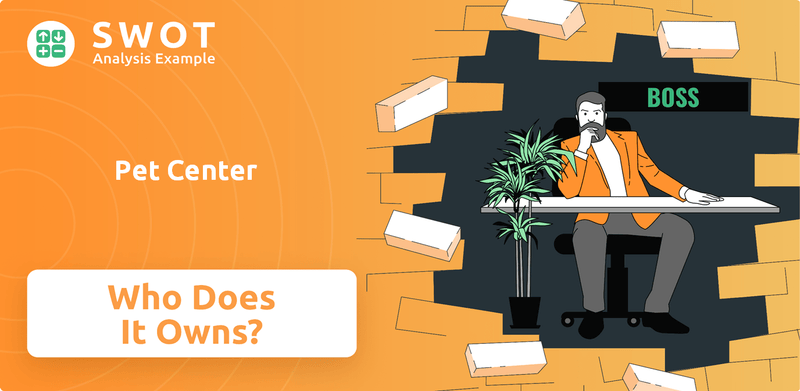
Delving into Pet Center's ownership reveals a fascinating story of growth and transformation. Knowing the Pet Center parent company and its major shareholders provides valuable insights into its financial performance and future expansion plans. This analysis will clarify the Pet Center ownership structure details, including the influence of Pet Center executives and the impact of its market share and competitors. Uncover the Pet Center history and learn how to contact Pet Center corporate to get more information.
Who Founded Pet Center?
The story of Petz, formerly known as Pet Center Marginal, began on August 17th, 2002. Sergio Zimerman established the company with a vision to create a comprehensive pet care destination. The first store opened its doors on Marginal Tietê in São Paulo, marking the start of what would become a significant pet store chain.
While the precise initial ownership structure is not publicly detailed, Sergio Zimerman's role as the founder indicates his foundational control. His continued significant stake highlights his influence over the company's early direction and strategic decisions. This early phase was crucial in setting the stage for Petz's future growth and market presence.
The entry of Warburg Pincus in 2013 was a pivotal moment in Petz's history, shaping both its ownership and strategic direction. This investment allowed Sergio Zimerman to remain a partner and CEO. The infusion of private equity facilitated expansion and modernization efforts, including a new standardized store layout. This shift from a founder-owned entity to one with substantial private equity backing was a key move to accelerate growth.
Founded on August 17th, 2002, by Sergio Zimerman. The initial name was Pet Center Marginal.
The first store was established on Marginal Tietê in São Paulo.
Sergio Zimerman's role as founder indicates his foundational control.
Warburg Pincus invested in 2013, allowing Zimerman to remain CEO and partner.
Transitioned from a founder-owned entity to one with private equity backing.
The investment facilitated expansion and modernization, including a new store layout.
Understanding the early ownership structure of Petz provides context for its growth trajectory. The initial vision of Sergio Zimerman and the strategic investment by Warburg Pincus were critical. For more insights into the competitive environment, you can explore the Competitors Landscape of Pet Center.
- 2002: Founding of Petz.
- 2013: Warburg Pincus invests, aiding expansion.
- Founder: Sergio Zimerman.
- Strategic Focus: Comprehensive pet care destination.
Pet Center SWOT Analysis
- Complete SWOT Breakdown
- Fully Customizable
- Editable in Excel & Word
- Professional Formatting
- Investor-Ready Format
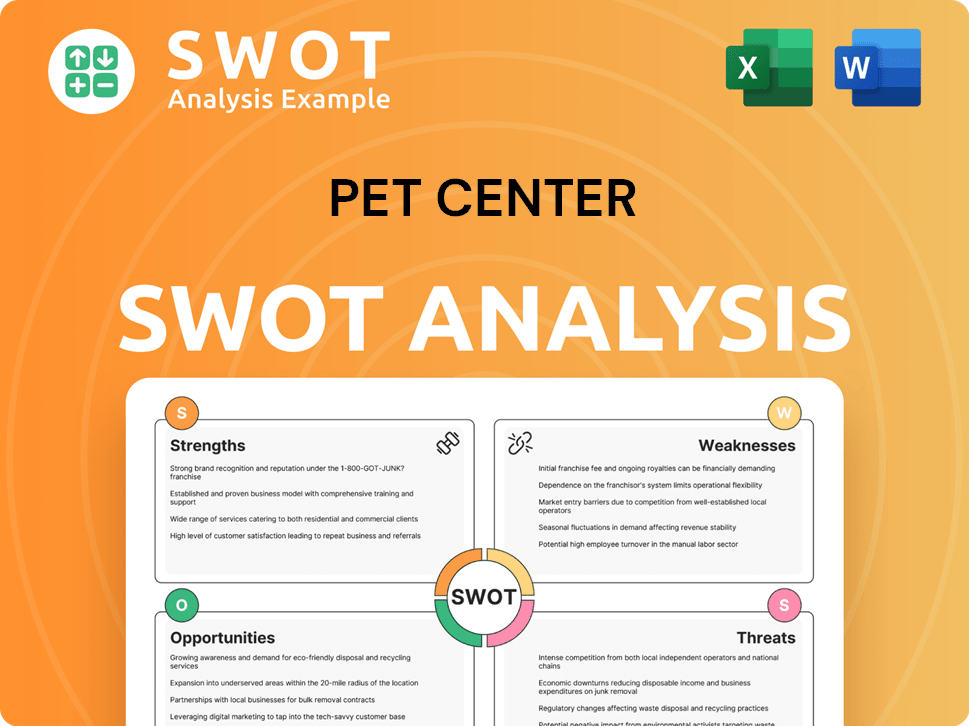
How Has Pet Center’s Ownership Changed Over Time?
The evolution of Petz's ownership has been marked by significant milestones, particularly its shift to a publicly listed entity. The company's initial public offering (IPO) and subsequent follow-on offerings have been crucial in shaping its current ownership structure. In November 2022, Petz conducted its first follow-on offering, raising approximately R$780 million. This demonstrated continued investor confidence and provided capital for growth. Understanding the Marketing Strategy of Pet Center can also provide deeper insights into the company's growth trajectory.
A pivotal development impacting Petz's ownership is the proposed merger with Cobasi, announced in August 2024. This strategic move aims to create the largest pet retail company in Brazil. The merger agreement stipulates that Petz shareholders will hold a majority stake of 52.6% in the combined entity, with Cobasi owning 47.4%. This transaction also includes an initial payment of R$400 million to Petz shareholders, including R$130 million in pre-transaction dividends. The merger is expected to finalize in 2025, pending regulatory approvals.
| Stakeholder | Percentage of Ownership (August 2024) | Number of Shares |
|---|---|---|
| Individual Insiders | 34.2% | 154,415,975 |
| Institutions | 18% | Not Specified |
| Hedge Funds | 16.4% | Not Specified |
| General Public | 19.4% | Not Specified |
| Public Companies | 11.9% | Not Specified |
As of August 2024, Petz (PETZ3) shows a diverse ownership structure. Individual insiders hold the largest share at 34.2%, indicating strong alignment between management and company performance. Institutions hold 18% of the shares, while hedge funds account for 16.4%. The general public owns 19.4% of the shares, and public companies collectively hold 11.9%. The merger with Cobasi is poised to reshape this landscape further, with Petz shareholders gaining a majority stake in the combined entity.
Petz is a publicly traded company on the B3 (Brazilian stock exchange) under the ticker PETZ3.
- Individual insiders hold the largest share of 34.2%.
- The merger with Cobasi will give Petz shareholders a 52.6% stake in the combined company.
- The merger is expected to generate R$6.9 billion ($1.3 billion) in net revenue.
- The merger is anticipated to finalize in 2025.
Pet Center PESTLE Analysis
- Covers All 6 PESTLE Categories
- No Research Needed – Save Hours of Work
- Built by Experts, Trusted by Consultants
- Instant Download, Ready to Use
- 100% Editable, Fully Customizable
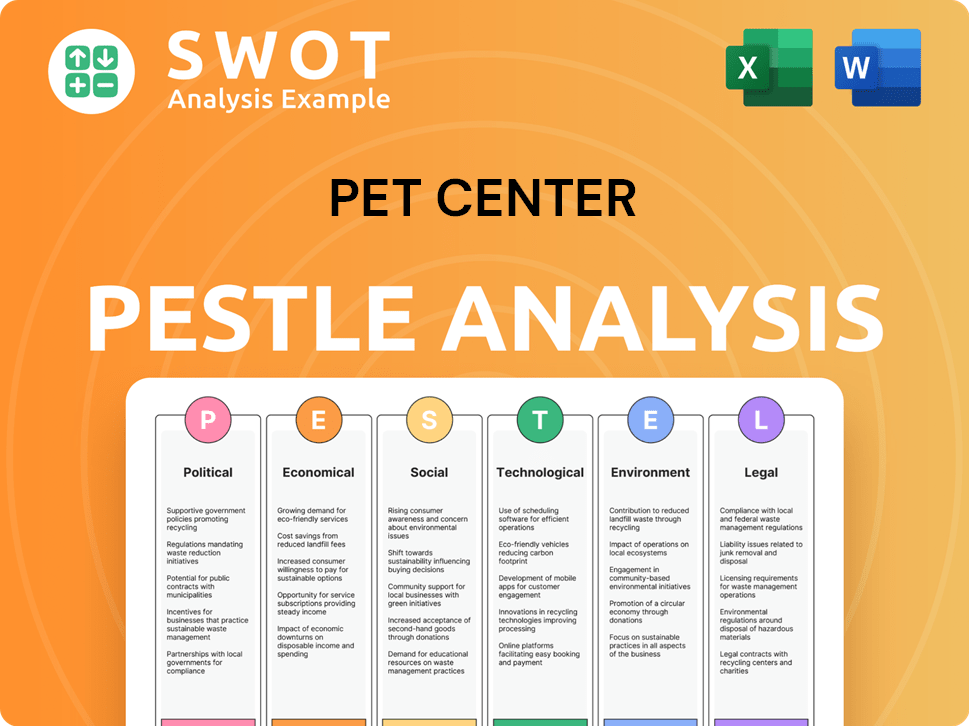
Who Sits on Pet Center’s Board?
The current board of directors of Petz, the pet store chain, includes a mix of representatives from major shareholders, founders, and independent members. This structure aims to oversee the company's strategic direction and ensure good governance. Specific details about the complete current board, including names and affiliations, aren't all publicly available. However, the proposed merger with Cobasi provides insights into the future board's composition.
Following the merger, the combined company is planned to have nine board members. Cobasi's current controllers will appoint five of these members, while Petz's reference shareholder, Sergio Zimerman, will appoint the remaining four. Sergio Zimerman, the founder and CEO of Petz, is set to become the Chairman of the Board for the merged entity. Paulo Nassar, the Founder and CEO of Cobasi, will take on the role of CEO for the combined company. This arrangement suggests a balanced distribution of power, with significant influence from both founding entities. Understanding Pet Center ownership is key to grasping the company's strategic direction.
| Board Member | Role | Affiliation |
|---|---|---|
| Sergio Zimerman | Chairman of the Board (post-merger) | Petz founder, reference shareholder |
| Paulo Nassar | CEO (post-merger) | Cobasi Founder and CEO |
| Board Members (5) | To be appointed | Cobasi's current controllers |
| Board Members (4) | To be appointed | Sergio Zimerman |
Regarding voting power, Petz, a publicly traded company, is listed on the Novo Mercado segment of the São Paulo stock exchange. This segment typically enforces stricter governance rules, often implying a one-share-one-vote structure. However, Sergio Zimerman's substantial direct ownership of ordinary shares gives him significant voting influence. As of September 2024, Zimerman held 33.4% of the shares directly. His direct ownership includes 30.8% of the company's share capital directly and 2.6% indirectly through the Platina 55 FIM fund. Additionally, Zimerman has the potential to increase his stake by approximately 14.9% through financial derivatives. This significant ownership highlights the importance of understanding Pet Center parent company dynamics.
The board of directors will be reshaped after the merger with Cobasi, with a balanced representation from both companies. Sergio Zimerman, the founder, holds a significant portion of the voting power, ensuring his influence on strategic decisions.
- The merged company will have nine board members.
- Sergio Zimerman will be Chairman of the Board.
- Zimerman's direct ownership is 33.4% as of September 2024.
- The merger aims to create a leading pet store chain.
Pet Center Business Model Canvas
- Complete 9-Block Business Model Canvas
- Effortlessly Communicate Your Business Strategy
- Investor-Ready BMC Format
- 100% Editable and Customizable
- Clear and Structured Layout
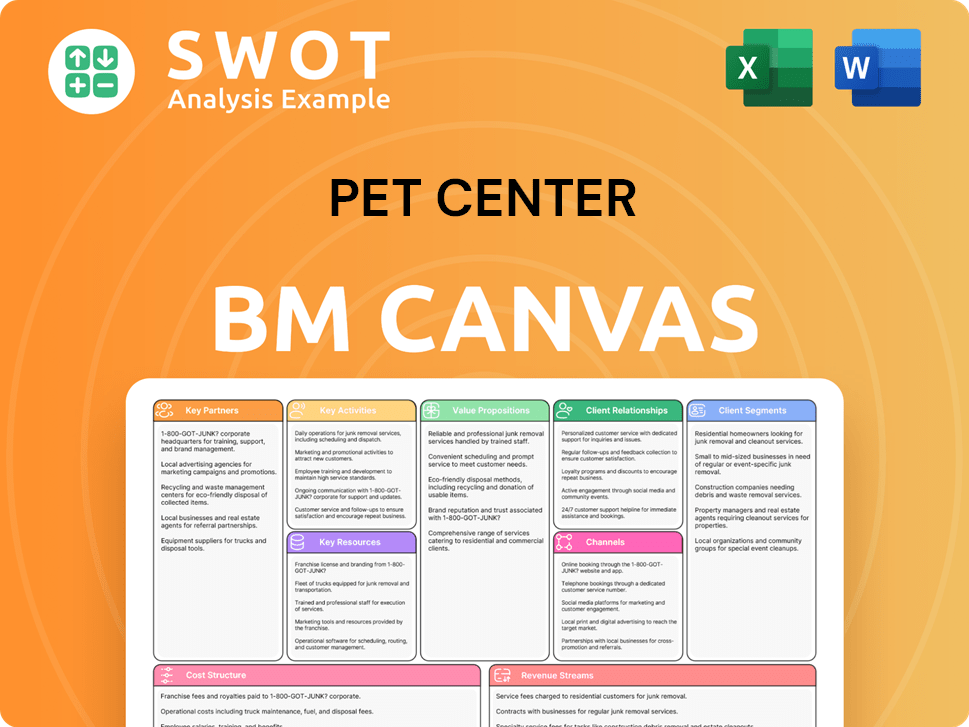
What Recent Changes Have Shaped Pet Center’s Ownership Landscape?
Over the past few years, shifts in Petz's ownership have been noticeable. A key development is the increased stake of the founder and CEO, Sergio Zimerman. As of September 2024, he directly owns 33.4% of the company's ordinary shares, totaling 154,415,975 shares. This includes 30.8% held directly and an additional 2.6% through the Platina 55 FIM fund. He may potentially hold an extra 14.9% through financial derivatives. This concentration of ownership by the founder indicates a strong commitment to the company's future.
The most significant merger and acquisition (M&A) event is the proposed merger with Cobasi, announced in August 2024. This deal, awaiting regulatory approval from CADE in Brazil, aims to create Brazil's largest pet retail chain. Petz shareholders are set to hold 52.6% of the combined entity. The combined company is projected to have annual gross revenue of approximately R$7 billion ($1.56 billion) and operate nearly 500 stores across 140 Brazilian cities. This demonstrates the consolidation within the Brazilian pet care market, which generated over R$60 billion (about $12 billion) in revenue in 2022.
| Ownership Aspect | Details | Data |
|---|---|---|
| Founder & CEO Stake | Sergio Zimerman's direct ownership | 33.4% as of September 2024 |
| Proposed Merger | Merger with Cobasi | Petz shareholders to hold 52.6% of combined entity |
| Combined Revenue Projection | Combined annual gross revenue | Approximately R$7 billion ($1.56 billion) |
Petz has also strategically acquired other companies. In January 2022, it acquired a 51% stake in Petix, a dog pad manufacturer, for $12.8 million. This followed the acquisitions of Zee.Dog in August 2021, for $163 million and $138 million respectively. These acquisitions show the company's strategy to broaden its product offerings and market reach. The Target Market of Pet Center also shows the company's growth.
The primary owner of Petz is the founder and CEO, Sergio Zimerman, holding a significant percentage of the company's shares. The ownership structure also includes institutional investors and potentially, through the Cobasi merger, a wider shareholder base.
The most significant change is the proposed merger with Cobasi, which will reshape the ownership structure. Strategic acquisitions like Petix and Zee.Dog have also impacted the company's portfolio and market presence.
The U.S. pet industry is projected to reach $157 billion in 2025. The Brazilian pet market is the largest in Latin America. Increased institutional ownership and market consolidation are emerging trends. E-commerce has significantly impacted the pet care market, with online sales showing strong growth.
Strategic mergers and acquisitions are crucial for market leadership. A strong digital presence is also vital. These trends suggest a dynamic environment for Petz, where adapting to market changes is essential for maintaining and growing its market share.
Pet Center Porter's Five Forces Analysis
- Covers All 5 Competitive Forces in Detail
- Structured for Consultants, Students, and Founders
- 100% Editable in Microsoft Word & Excel
- Instant Digital Download – Use Immediately
- Compatible with Mac & PC – Fully Unlocked
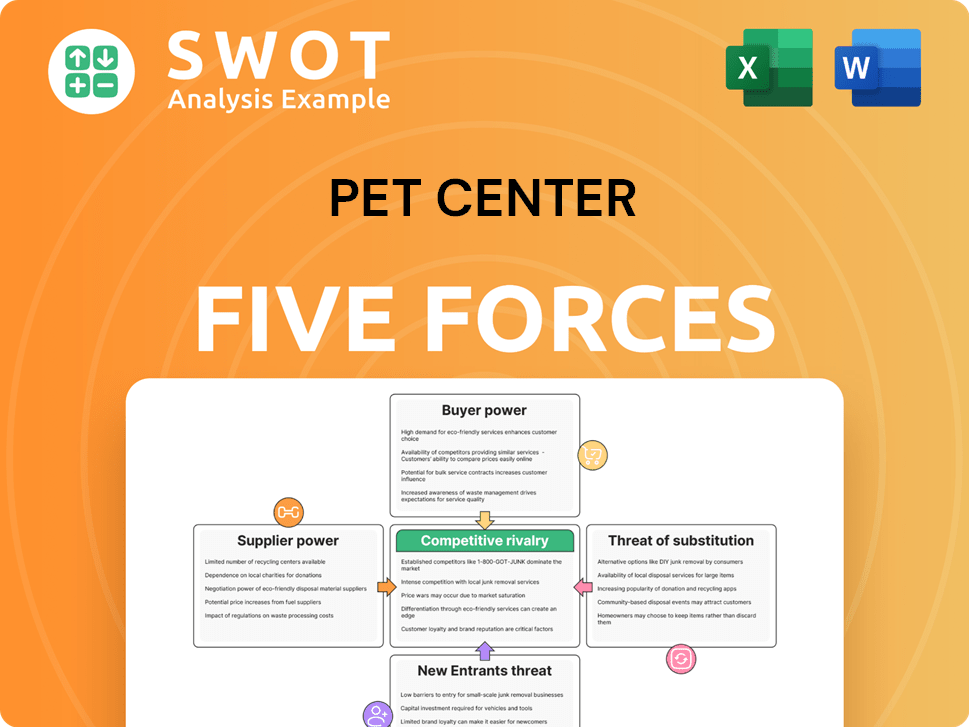
Related Blogs
- What are Mission Vision & Core Values of Pet Center Company?
- What is Competitive Landscape of Pet Center Company?
- What is Growth Strategy and Future Prospects of Pet Center Company?
- How Does Pet Center Company Work?
- What is Sales and Marketing Strategy of Pet Center Company?
- What is Brief History of Pet Center Company?
- What is Customer Demographics and Target Market of Pet Center Company?
Disclaimer
All information, articles, and product details provided on this website are for general informational and educational purposes only. We do not claim any ownership over, nor do we intend to infringe upon, any trademarks, copyrights, logos, brand names, or other intellectual property mentioned or depicted on this site. Such intellectual property remains the property of its respective owners, and any references here are made solely for identification or informational purposes, without implying any affiliation, endorsement, or partnership.
We make no representations or warranties, express or implied, regarding the accuracy, completeness, or suitability of any content or products presented. Nothing on this website should be construed as legal, tax, investment, financial, medical, or other professional advice. In addition, no part of this site—including articles or product references—constitutes a solicitation, recommendation, endorsement, advertisement, or offer to buy or sell any securities, franchises, or other financial instruments, particularly in jurisdictions where such activity would be unlawful.
All content is of a general nature and may not address the specific circumstances of any individual or entity. It is not a substitute for professional advice or services. Any actions you take based on the information provided here are strictly at your own risk. You accept full responsibility for any decisions or outcomes arising from your use of this website and agree to release us from any liability in connection with your use of, or reliance upon, the content or products found herein.